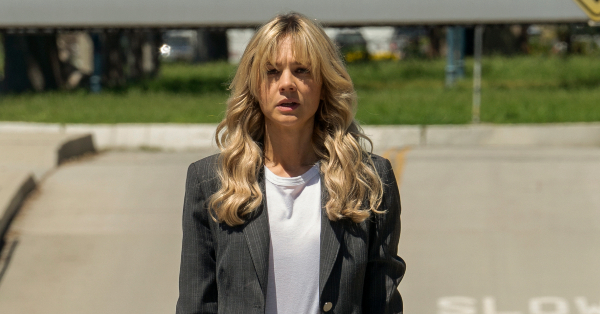Criticize Promising Young Woman at your peril, as Variety discovered. Innocuous comments from Dennis Harvey about star Carey Mulligan ignited a firestorm of rebukes, some from Ms. Mulligan herself.

The movie has more fundamental flaws than Ms. Mulligan’s performance, ranging from a glib, superficial script to an affectless directing style, over-determined production design, and “ironic” soundtrack. The fact that Emerald Fennell’s script dovetails with the themes and tone of Killing Eve, a series on which she worked, has resulted in glowing reviews from the predictable suspects. Promising Young Woman is really a case of old wine in cardboard boxes.
From the opening crotch shots of drunken businessmen who can’t keep time with the pop tunes they don’t understand, Promising Young Woman is out to deliver a message. Many messages. Rape is bad, rape culture is bad, men can’t be trusted, some women can’t be trusted, parents are idiots, the suburbs are weird, and just because I dress up like Janine Lindemulder on Enema of the State doesn’t mean I want to sleep with you.
Mulligan plays Cassie, a college dropout living with her parents and working in a coffeeshop. Sometimes she dons “sexy” outfits, pretends to be drunk, and lets unsuspecting men take her home for their comeuppance. She encounters the past in the form of a former classmate (Bo Burnham), which dredges up horrible memories but also offers the hope of moving on. Then bad things happen, both to the people Cassie meets and to Cassie herself.
Bright and sparkly when it’s not drab and purposeful, Promising Young Woman ignores basics like rhythm, pacing, and logic, bouncing from one obvious point to the next, whacking absurdly easy targets while indulging in the kind of fetishizing it ostensibly abhors.
The frilly clothes, pastel sets, and discreet cinematography suggest a paranoid, 1950s mindset, an anti-Leave It to Beaver or Father Knows Best, a twinge of Twilight Zone when Cassie’s mom (the always reliable Jennifer Coolidge) lets loose. It’s a style that’s been flogged to death, one whose ability to shock and surprise has dimmed with every episode of The Goldbergs.

What struck me watching Promising Young Woman on a desktop Mac (I know, not ideal) was how its look resembled the thin veneer of an old Roger Corman movie, something like Bucket of Blood or Little Shop of Horrors, one of those “satirical” takes on morality where doors are flung open and curtains cast aside to reveal the truth behind society’s ills. Corman’s movies have their moments, but they can be summed up a lot of times as clever ideas executed poorly.
On the other hand, there’s the Looking for Mr. Goodbar world of bars and clubs, where Cassie lures unsuspecting creeps to their doom. A David Goodis novel set in Los Angeles instead of on the Philadelphia waterfront. Some of Cassie’s encounters build an undeniable sense of malaise, even if they’re just reverse-gender Tarantino riffs. Maybe the fact that they have no payoff, no “money shot,” is Fennell’s choice. Maybe it’s just poor writing.
Asking Promising Young Woman to be something it isn’t plays directly into Fennell’s hands. It’s not her fault the male gaze isn’t satisfied, it’s the fault of a society that undermines and demeans women. Take exception to casting, performance, plotting, production design, or any other element of this movie, and you are confirming Fennell’s points. But even if you believe society is sexist and racist and ageist and ableist and all the rest, that won’t make this movie any better.


